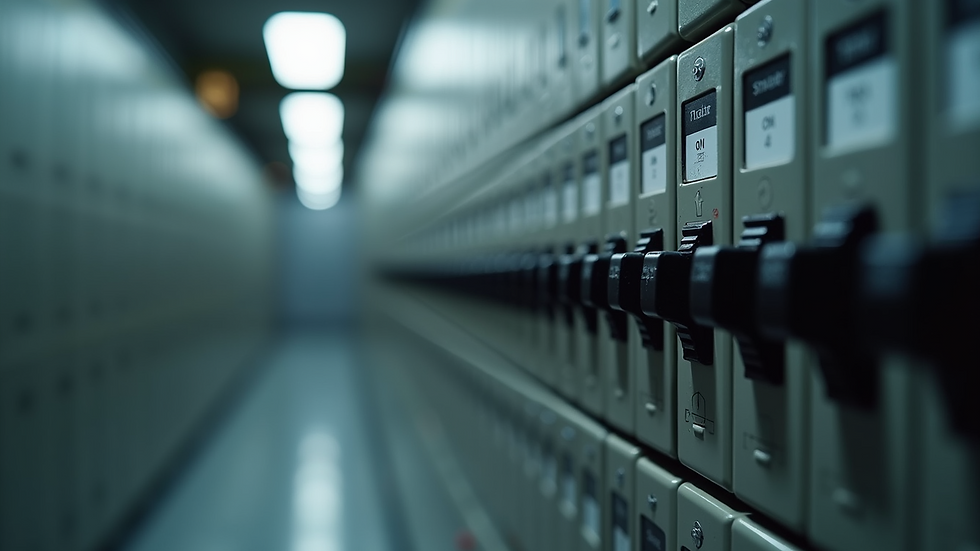How to Handle Electrical Emergencies Safely
- paul cerri
- Sep 22
- 4 min read
Electrical emergencies can happen unexpectedly and pose serious risks to your safety and property. Knowing how to respond quickly and correctly is essential to prevent injury, damage, or even fire. This guide will walk you through practical steps to handle electrical emergencies safely, helping you stay calm and act effectively when the situation arises.
Understanding Electrical Emergencies
Electrical emergencies involve situations where electricity causes immediate danger or damage. These can include electrical shocks, sparks, exposed wires, or power outages that affect safety. Recognising the signs early can help you take swift action to reduce risks.
Some common causes of electrical emergencies are:
Faulty wiring or damaged cables
Overloaded circuits or appliances
Water coming into contact with electrical devices
Sudden power surges or outages
Electrical fires starting from outlets or appliances
Being aware of these causes helps you identify potential hazards before they escalate.

Damaged wiring can lead to serious electrical emergencies if not addressed promptly.
How to Respond to Electrical Emergencies
When faced with an electrical emergency, your priority should be safety. Follow these steps to protect yourself and others:
Turn off the power - If safe to do so, switch off the main electrical supply or the circuit breaker connected to the affected area. This stops the flow of electricity and reduces the risk of shock or fire.
Avoid touching electrical equipment - Do not touch any appliances, wires, or outlets involved in the emergency, especially if you are wet or standing on a wet surface.
Keep others away - Warn family members or colleagues to stay clear of the danger zone until the issue is resolved.
Use non-conductive materials - If someone is receiving an electric shock, do not touch them directly. Use a wooden stick or rubber item to separate them from the electrical source.
Call for professional help - Contact emergency electrician services immediately to handle the problem safely and efficiently.
Do not attempt repairs yourself - Electrical systems are complex and dangerous. Only qualified electricians should perform repairs.
Have a fire extinguisher ready - If an electrical fire starts, use a Class C fire extinguisher designed for electrical fires. Never use water.

Turning off the circuit breaker can prevent further electrical hazards during an emergency.
What is considered an electrical emergency?
Knowing what qualifies as an electrical emergency helps you decide when to act quickly or call for help. Here are some situations that require immediate attention:
Electrical shock or electrocution - If someone is shocked, they need urgent medical help.
Sparks or smoke from outlets or appliances - This indicates a serious fault that could lead to fire.
Burning smell or visible fire near electrical equipment - Act immediately to extinguish the fire safely and call emergency services.
Power outages affecting critical systems - Such as medical devices or security systems.
Exposed or frayed wiring - Especially if it is sparking or causing intermittent power.
Water contact with electrical devices - This can cause short circuits and shocks.
If you encounter any of these, treat the situation as an emergency and follow safety protocols.

Smoke detectors can alert you early to electrical fires, helping prevent emergencies.
Preventing Electrical Emergencies
Prevention is the best way to avoid electrical emergencies. Here are practical tips to keep your home or workplace safe:
Regular inspections - Have a qualified electrician check your wiring and electrical systems periodically.
Avoid overloading sockets - Use power strips with surge protection and do not plug too many devices into one outlet.
Keep electrical devices away from water - Ensure appliances are dry and never use them near sinks or bathtubs.
Replace damaged cords and plugs - Do not use appliances with frayed or broken cables.
Install smoke detectors and circuit breakers - These devices provide early warnings and cut off power during faults.
Educate family or staff - Teach everyone basic electrical safety and emergency response steps.
By following these measures, you reduce the risk of emergencies and protect your property and loved ones.
When to Call for Professional Help
Some electrical issues may seem minor but can quickly become dangerous. It is important to know when to seek professional assistance:
If you notice flickering lights or frequent circuit breaker trips
When outlets or switches feel warm or emit a burning smell
If you see sparks or smoke from electrical devices
After any electrical shock incident
When planning electrical upgrades or repairs
Using emergency electrician services ensures that trained experts handle the problem safely and comply with regulations. Do not delay calling a professional if you suspect an electrical hazard.
Staying Safe After an Electrical Emergency
Once the immediate danger is addressed, take these steps to ensure ongoing safety:
Have a full electrical inspection - Confirm that all issues are repaired and systems are safe.
Replace damaged appliances - Faulty devices can cause future emergencies.
Review your emergency plan - Make sure everyone knows what to do if another electrical problem occurs.
Keep emergency contacts handy - Save numbers for electricians and emergency services.
Being prepared helps you respond calmly and effectively if electrical emergencies happen again.
Handling electrical emergencies safely requires knowledge, quick action, and the right support. By understanding risks, following safety steps, and calling professional help when needed, you can protect yourself and your property from harm. Stay vigilant and proactive to keep your environment safe from electrical hazards.




Comments